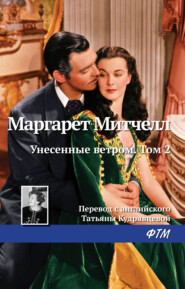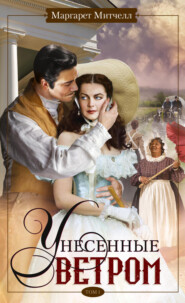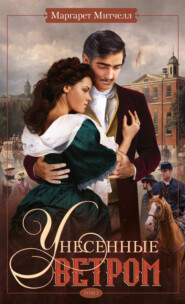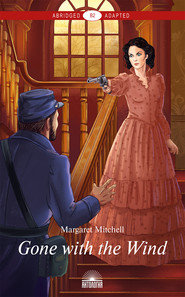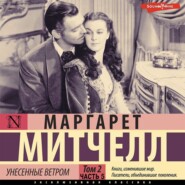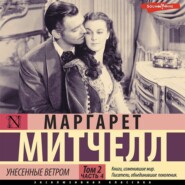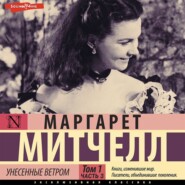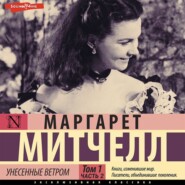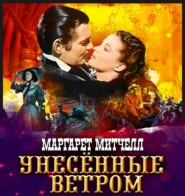По всем вопросам обращайтесь на: info@litportal.ru
(©) 2003-2024.
✖
Gone with the Wind. Volume 2 / Унесенные ветром. Том 2
Настройки чтения
Размер шрифта
Высота строк
Поля
“And they in hating,” finished Tommy. “Eh, Scarlett? It bothers the ladies to see what their men folks have come down to lots more than it bothers us. Hugh was to be a judge, Rene was to play the fiddle before the crowned heads of Europe-” He ducked as Rene aimed a blow at him. “And I was to be a doctor and now-”
“Geeve us ze time!” cried Rene. “Zen I become ze Pie Prince of ze South! And my good Hugh ze King of ze Kindling and you, my Tommy, you weel own ze Irish slaves instead of ze darky slaves. What changes-what fun! And what eet do for you, Mees Scarlett, and Mees Melly? You meelk ze cow, peek ze cotton?”
“Indeed, no!” said Scarlett coolly, unable to understand Rene's gay acceptance of hardships. “Our darkies do that.”
“Mees Melly, I hear she call her boy 'Beauregard.' You tell her I, Rene, approve and say that except for 'Jesus' there is no bettaire name.”
And though he smiled, his eyes glowed proudly at the name of Louisiana's dashing hero.
“Well, there's 'Robert Edward Lee,'“ observed Tommy. “And while I'm not trying to lessen Old Beau's reputation, my first son is going to be named 'Bob Lee Wellburn.'“
Rene laughed and shrugged.
“I recount to you a joke but eet eez a true story. And you see how Creoles zink of our brave Beauregard and of your General Lee. On ze train near New Orleans a man of Virginia, a man of General Lee, he meet wiz a Creole of ze troops of Beauregard. And ze man of Virginia, he talk, talk, talk how General Lee do zis, General Lee say zat. And ze Creole, he look polite and he wreenkle hees forehead lak he try to remembaire, and zen he smile and say: 'General Lee! Ah, oui! Now I know! General Lee! Ze man General Beauregard speak well of!'“
Scarlett tried to join politely in the laughter but she did not see any point to the story except that Creoles were just as stuck up as Charleston and Savannah people. Moreover, she had always thought Ashley's son should have been named after him.
The musicians after preliminary tunings and whangings broke into “Old Dan Tucker” and Tommy turned to her.
“Will you dance, Scarlett? I can't favor you but Hugh or Rene-”
“No, thank you. I'm still mourning my mother,” said Scarlett hastily. “I will sit them out.”
Her eyes singled out Frank Kennedy and beckoned him from the side of Mrs. Elsing.
“I'll sit in that alcove yonder if you'll bring me some refreshments and then we can have a nice chat,” she told Frank as the other three men moved off.
When he had hurried away to bring her a glass of wine and a paper thin slice of cake, Scarlett sat down in the alcove at the end of the drawing room and carefully arranged her skirts so that the worst spots would not show. The humiliating events of the morning with Rhett were pushed from her mind by the excitement of seeing so many people and hearing music again. Tomorrow she would think of Rhett's conduct and her shame and they would make her writhe again. Tomorrow she would wonder if she had made any impression on Frank's hurt and bewildered heart. But not tonight. Tonight she was alive to her finger tips, every sense alert with hope, her eyes sparkling.
She looked from the alcove into the huge drawing room and watched the dancers, remembering how beautiful this room had been when first she came to Atlanta during the war. Then the hardwood floors had shone like glass, and overhead the chandelier with its hundreds of tiny prisms had caught and reflected every ray of the dozens of candles it bore, flinging them, like gleams from diamonds, flame and sapphire about the room. The old portraits on the walls had been dignified and gracious and had looked down upon guests with an air of mellowed hospitality. The rosewood sofas had been soft and inviting and one of them, the largest, had stood in the place of honor in this same alcove where she now sat. It had been Scarlett's favorite seat at parties. From this point stretched the pleasant vista of drawing room and dining room beyond, the oval mahogany table which seated twenty and the twenty slim-legged chairs demurely against the walls, the massive sideboard and buffet weighted with heavy silver, with seven-branched candlesticks, goblets, cruets, decanters and shining little glasses. Scarlett had sat on that sofa so often in the first years of the war, always with some handsome officer beside her, and listened to violin and bull fiddle, accordion and banjo, and heard the exciting swishing noises which dancing feet made on the waxed and polished floor.
Now the chandelier hung dark. It was twisted askew and most of the prisms were broken, as if the Yankee occupants had made their beauty a target for their boots. Now an oil lamp and a few candles lighted the room and the roaring fire in the wide hearth gave most of the illumination. Its flickering light showed how irreparably scarred and splintered the dull old floor was. Squares on the faded paper on the wall gave evidence that once the portraits had hung there, and wide cracks in the plaster recalled the day during the siege when a shell had exploded on the house and torn off parts of the roof and second floor. The heavy old mahogany table, spread with cake and decanters, still presided in the empty-looking dining room but it was scratched and the broken legs showed signs of clumsy repair. The sideboard, the silver and the spindly chairs were gone. The dull-gold damask draperies which had covered the arching French windows at the back of the room were missing, and only the remnants of the lace curtains remained, clean but obviously mended.
In place of the curved sofa she had liked so much was a hard bench that was none too comfortable. She sat upon it with as good grace as possible, wishing her skirts were in such condition that she could dance. It would be so good to dance again. But, of course, she could do more with Frank in this sequestered alcove than in a breathless reel and she could listen fascinated to his talk and encourage him to greater flights of foolishness.
But the music certainly was inviting. Her slipper patted longingly in time with old Levi's large splayed foot as he twanged a strident banjo and called the figures of the reel. Feet swished and scraped and patted as the twin lines danced toward each other, retreated, whirled and made arches of their arms.
“'Ole Dan Tucker he got drunk – '
(Swing yo' padners!)
'Fell in de fiah' an' he kick up a chunk!'
(Skip light, ladies!)”
After the dull and exhausting months at Tara it was good to hear music again and the sound of dancing feet, good to see familiar friendly faces laughing in the feeble light, calling old jokes and catchwords, bantering, rallying, coquetting. It was like coming to life again after being dead. It almost seemed that the bright days of five years ago had come back again. If she could close her eyes and not see the worn made-over dresses and the patched boots and mended slippers, if her mind did not call up the faces of boys missing from the reel, she might almost think that nothing had changed. But as she looked, watching the old men grouped about the decanter in the dining room, the matrons lining the walls, talking behind fanless hands, and the swaying, skipping young dancers, it came to her suddenly, coldly, frighteningly that it was all as greatly changed as if these familiar figures were ghosts.
They looked the same but they were different. What was it? Was it only that they were five years older? No, it was something more than the passing of time. Something had gone out of them, out of their world. Five years ago, a feeling of security had wrapped them all around so gently they were not even aware of it. In its shelter they had flowered. Now it was gone and with it had gone the old thrill, the old sense of something delightful and exciting just around the corner, the old glamor of their way of living.
She knew she had changed too, but not as they had changed, and it puzzled her. She sat and watched them and she felt herself an alien among them, as alien and lonely as if she had come from another world, speaking a language they did not understand and she not understanding theirs. Then she knew that this feeling was the same one she felt with Ashley. With him and with people of his kind-and they made up most of her world-she felt outside of something she could not understand.
Their faces were little changed and their manners not at all but it seemed to her that these two things were all that remained of her old friends. An ageless dignity, a timeless gallantry still clung about them and would cling until they died but they would carry undying bitterness to their graves, a bitterness too deep for words. They were a soft-spoken, fierce, tired people who were defeated and would not know defeat, broken yet standing determinedly erect. They were crushed and helpless, citizens of conquered provinces. They were looking on the state they loved, seeing it trampled by the enemy, rascals making a mock of the law, their former slaves a menace, their men disfranchised, their women insulted. And they were remembering graves.
Everything in their old world had changed but the old forms. The old usages went on, must go on, for the forms were all that were left to them. They were holding tightly to the things they knew best and loved best in the old days, the leisured manners, the courtesy, the pleasant casualness in human contacts and, most of all, the protecting attitude of the men toward their women. True to the tradition in which they had been reared, the men were courteous and tender and they almost succeeded in creating an atmosphere of sheltering their women from all that was harsh and unfit for feminine eyes. That, thought Scarlett, was the height of absurdity, for there was little, now, which even the most cloistered women had not seen and known in the last five years. They had nursed the wounded, closed dying eyes, suffered war and fire and devastation, known terror and flight and starvation.
But, no matter what sights they had seen, what menial tasks they had done and would have to do, they remained ladies and gentlemen, royalty in exile-bitter, aloof, incurious, kind to one another, diamond hard, as bright and brittle as the crystals of the broken chandelier over their heads. The old days had gone but these people would go their ways as if the old days still existed, charming, leisurely, determined not to rush and scramble for pennies as the Yankees did, determined to part with none of the old ways.
Scarlett knew that she, too, was greatly changed. Otherwise she could not have done the things she had done since she was last in Atlanta; otherwise she would not now be contemplating doing what she desperately hoped to do. But there was a difference in their hardness and hers and just what the difference was, she could not, for the moment, tell. Perhaps it was that there was nothing she would not do, and there were so many things these people would rather die than do. Perhaps it was that they were without hope but still smiling at life, bowing gracefully and passing it by. And this Scarlett could not do.
She could not ignore life. She had to live it and it was too brutal, too hostile, for her even to try to gloss over its harshness with a smile. Of the sweetness and courage and unyielding pride of her friends, Scarlett saw nothing. She saw only a silly stiff-neckedness which observed facts but smiled and refused to look them in the face.
As she stared at the dancers, flushed from the reel, she wondered if things drove them as she was driven, dead lovers, maimed husbands, children who were hungry, acres slipping away, beloved roofs that sheltered strangers. But, of course, they were driven! She knew their circumstances only a little less thoroughly than she knew her own. Their losses had been her losses, their privations her privations, their problems her same problems. Yet they had reacted differently to them. The faces she was seeing in the room were not faces; they were masks, excellent masks which would never drop.
But if they were suffering as acutely from brutal circumstances as she was-and they were-how could they maintain this air of gaiety and lightness of heart? Why, indeed, should they even try to do it? They were beyond her comprehension and vaguely irritating. She couldn't be like them. She couldn't survey the wreck of the world with an air of casual unconcern. She was as hunted as a fox, running with a bursting heart, trying to reach a burrow before the hounds caught up.
Suddenly she hated them all because they were different from her, because they carried their losses with an air that she could never attain, would never wish to attain. She hated them, these smiling, light-footed strangers, these proud fools who took pride in something they had lost, seeming to be proud that they had lost it. The women bore themselves like ladies and she knew they were ladies, though menial tasks were their daily lot and they didn't know where their next dress was coming from. Ladies all! But she could not feel herself a lady, for all her velvet dress and scented hair, for all the pride of birth that stood behind her and the pride of wealth that had once been hers. Harsh contact with the red earth of Tara had stripped gentility from her and she knew she would never feel like a lady again until her table was weighted with silver and crystal and smoking with rich food, until her own horses and carriages stood in her stables, until black hands and not white took the cotton from Tara.
“Ah!” she thought angrily, sucking in her breath. “That's the difference! Even though they're poor, they still feel like ladies and I don't. The silly fools don't seem to realize that you can't be a lady without money!”
Even in this flash of revelation, she realized vaguely that, foolish though they seemed, theirs was the right attitude. Ellen would have thought so. This disturbed her. She knew she should feel as these people felt, but she could not. She knew she should believe devoutly, as they did, that a born lady remained a lady, even if reduced to poverty, but she could not make herself believe it now.
All her life she had heard sneers hurled at the Yankees because their pretensions to gentility were based on wealth, not breeding. But at this moment, heresy though it was, she could not help thinking the Yankees were right on this one matter, even if wrong in all others. It took money to be a lady. She knew Ellen would have fainted had she ever heard such words from her daughter. No depth of poverty could ever have made Ellen feel ashamed. Ashamed! Yes, that was how Scarlett felt. Ashamed that she was poor and reduced to galling shifts and penury and work that negroes should do.
She shrugged in irritation. Perhaps these people were right and she was wrong but, just the same, these proud fools weren't looking forward as she was doing, straining every nerve, risking even honor and good name to get back what they had lost. It was beneath the dignity of any of them to indulge in a scramble for money. The times were rude and hard. They called for rude and hard struggle if one was to conquer them. Scarlett knew that family tradition would forcibly restrain many of these people from such a struggle-with the making of money admittedly its aim. They all thought that obvious money-making and even talk of money were vulgar in the extreme. Of course, there were exceptions. Mrs. Merriwether and her baking and Rene driving the pie wagon. And Hugh Elsing cutting and peddling firewood and Tommy contracting. And Frank having the gumption to start a store. But what of the rank and file of them? The planters would scratch a few acres and live in poverty. The lawyers and doctors would go back to their professions and wait for clients who might never come. And the rest, those who had lived in leisure on their incomes? What would happen to them?
But she wasn't going to be poor all her life. She wasn't going to sit down and patiently wait for a miracle to help her. She was going to rush into life and wrest from it what she could. Her father had started as a poor immigrant boy and had won the broad acres of Tara. What he had done, his daughter could do. She wasn't like these people who had gambled everything on a Cause that was gone and were content to be proud of having lost that Cause, because it was worth any sacrifice. They drew their courage from the past. She was drawing hers from the future. Frank Kennedy, at present, was her future. At least, he had the store and he had cash money. And if she could only marry him and get her hands on that money, she could make ends meet at Tara for another year. And after that-Frank must buy the sawmill. She could see for herself how quickly the town was rebuilding and anyone who could establish a lumber business now, when there was so little competition, would have a gold mine.
There came to her, from the recesses of her mind, words Rhett had spoken in the early years of the war about the money he made in the blockade. She had not taken the trouble to understand them then, but now they seemed perfectly clear and she wondered if it had been only her youth or plain stupidity which had kept her from appreciating them.
“There's just as much money to be made in the wreck of a civilization as in the upbuilding of one.”
“This is the wreck he foresaw,” she thought, “and he was right. There's still plenty of money to be made by anyone who isn't afraid to work-or to grab.”
She saw Frank coming across the floor toward her with a glass of blackberry wine in his hand and a morsel of cake on a saucer and she pulled her face into a smile. It did not occur to her to question whether Tara was worth marrying Frank. She knew it was worth it and she never gave the matter a second thought.
She smiled up at him as she sipped the wine, knowing that her cheeks were more attractively pink than any of the dancers'. She moved her skirts for him to sit by her and waved her handkerchief idly so that the faint sweet smell of the cologne could reach his nose. She was proud of the cologne, for no other woman in the room was wearing any and Frank had noticed it. In a fit of daring he had whispered to her that she was as pink and fragrant as a rose.
If only he were not so shy! He reminded her of a timid old brown field rabbit. If only he had the gallantry and ardor of the Tarleton boys or even the coarse impudence of Rhett Butler. But, if he possessed those qualities, he'd probably have sense enough to feel the desperation that lurked just beneath her demurely fluttering eyelids. As it was, he didn't know enough about women even to suspect what she was up to. That was her good fortune but it did not increase her respect for him.
Chapter XXXVI
She married Frank Kennedy two weeks later after a whirlwind courtship which she blushingly told him left her too breathless to oppose his ardor any longer.
He did not know that during those two weeks she had walked the floor at night, gritting her teeth at the slowness with which he took hints and encouragements, praying that no untimely letter from Suellen would reach him and ruin her plans. She thanked God that her sister was the poorest of correspondents, delighting to receive letters and disliking to write them. But there was always a chance, always a chance, she thought in the long night hours as she padded back and forth across the cold floor of her bedroom, with Ellen's faded shawl clutched about her nightdress. Frank did not know she had received a laconic letter from Will, relating that Jonas Wilkerson had paid another call at Tara and, finding her gone to Atlanta, had stormed about until Will and Ashley threw him bodily off the place. Will's letter hammered into her mind the fact she knew only too well-that time was getting shorter and shorter before the extra taxes must be paid. A fierce desperation drove her as she saw the days slipping by and she wished she might grasp the hourglass in her hands and keep the sands from running.
But so well did she conceal her feelings, so well did she enact her role, Frank suspected nothing, saw no more than what lay on the surface-the pretty and helpless young widow of Charles Hamilton who greeted him every night in Miss Pittypat's parlor and listened, breathless with admiration, as he told of future plans for his store and how much money he expected to make when he was able to buy the sawmill. Her sweet sympathy and her bright-eyed interest in every word he uttered were balm upon the wound left by Suellen's supposed defection. His heart was sore and bewildered at Suellen's conduct and his vanity, the shy, touchy vanity of a middle-aged bachelor who knows himself to be unattractive to women, was deeply wounded. He could not write Suellen, upbraiding her for her faithlessness; he shrank from the very idea. But he could ease his heart by talking about her to Scarlett. Without saying a disloyal word about Suellen, she could tell him she understood how badly her sister had treated him and what good treatment he merited from a woman who really appreciated him.
Little Mrs. Hamilton was such a pretty pink-cheeked person, alternating between melancholy sighs when she thought of her sad plight, and laughter as gay and sweet as the tinkling of tiny silver bells when he made small jokes to cheer her. Her green gown, now neatly cleaned by Mammy, showed off her slender figure with its tiny waist to perfection, and how bewitching was the faint fragrance which always clung about her handkerchief and her hair! It was a shame that such a fine little woman should be alone and helpless in a world so rough that she didn't even understand its harshness. No husband nor brother nor even a father now to protect her. Frank thought the world too rude a place for a lone woman and, in that idea, Scarlett silently and heartily concurred.
He came to call every night, for the atmosphere of Pitty's house was pleasant and soothing. Mammy's smile at the front door was the smile reserved for quality folks, Pitty served him coffee laced with brandy and fluttered about him and Scarlett hung on his every utterance. Sometimes in the afternoons he took Scarlett riding with him in his buggy when he went out on business. These rides were merry affairs because she asked so many foolish questions-“just like a woman,” he told himself approvingly. He couldn't help laughing at her ignorance about business matters and she laughed too, saying: “Well, of course, you can't expect a silly little woman like me to understand men's affairs.”
She made him feel, for the first time in his old-maidish life, that he was a strong upstanding man fashioned by God in a nobler mold than other men, fashioned to protect silly helpless women.
“Geeve us ze time!” cried Rene. “Zen I become ze Pie Prince of ze South! And my good Hugh ze King of ze Kindling and you, my Tommy, you weel own ze Irish slaves instead of ze darky slaves. What changes-what fun! And what eet do for you, Mees Scarlett, and Mees Melly? You meelk ze cow, peek ze cotton?”
“Indeed, no!” said Scarlett coolly, unable to understand Rene's gay acceptance of hardships. “Our darkies do that.”
“Mees Melly, I hear she call her boy 'Beauregard.' You tell her I, Rene, approve and say that except for 'Jesus' there is no bettaire name.”
And though he smiled, his eyes glowed proudly at the name of Louisiana's dashing hero.
“Well, there's 'Robert Edward Lee,'“ observed Tommy. “And while I'm not trying to lessen Old Beau's reputation, my first son is going to be named 'Bob Lee Wellburn.'“
Rene laughed and shrugged.
“I recount to you a joke but eet eez a true story. And you see how Creoles zink of our brave Beauregard and of your General Lee. On ze train near New Orleans a man of Virginia, a man of General Lee, he meet wiz a Creole of ze troops of Beauregard. And ze man of Virginia, he talk, talk, talk how General Lee do zis, General Lee say zat. And ze Creole, he look polite and he wreenkle hees forehead lak he try to remembaire, and zen he smile and say: 'General Lee! Ah, oui! Now I know! General Lee! Ze man General Beauregard speak well of!'“
Scarlett tried to join politely in the laughter but she did not see any point to the story except that Creoles were just as stuck up as Charleston and Savannah people. Moreover, she had always thought Ashley's son should have been named after him.
The musicians after preliminary tunings and whangings broke into “Old Dan Tucker” and Tommy turned to her.
“Will you dance, Scarlett? I can't favor you but Hugh or Rene-”
“No, thank you. I'm still mourning my mother,” said Scarlett hastily. “I will sit them out.”
Her eyes singled out Frank Kennedy and beckoned him from the side of Mrs. Elsing.
“I'll sit in that alcove yonder if you'll bring me some refreshments and then we can have a nice chat,” she told Frank as the other three men moved off.
When he had hurried away to bring her a glass of wine and a paper thin slice of cake, Scarlett sat down in the alcove at the end of the drawing room and carefully arranged her skirts so that the worst spots would not show. The humiliating events of the morning with Rhett were pushed from her mind by the excitement of seeing so many people and hearing music again. Tomorrow she would think of Rhett's conduct and her shame and they would make her writhe again. Tomorrow she would wonder if she had made any impression on Frank's hurt and bewildered heart. But not tonight. Tonight she was alive to her finger tips, every sense alert with hope, her eyes sparkling.
She looked from the alcove into the huge drawing room and watched the dancers, remembering how beautiful this room had been when first she came to Atlanta during the war. Then the hardwood floors had shone like glass, and overhead the chandelier with its hundreds of tiny prisms had caught and reflected every ray of the dozens of candles it bore, flinging them, like gleams from diamonds, flame and sapphire about the room. The old portraits on the walls had been dignified and gracious and had looked down upon guests with an air of mellowed hospitality. The rosewood sofas had been soft and inviting and one of them, the largest, had stood in the place of honor in this same alcove where she now sat. It had been Scarlett's favorite seat at parties. From this point stretched the pleasant vista of drawing room and dining room beyond, the oval mahogany table which seated twenty and the twenty slim-legged chairs demurely against the walls, the massive sideboard and buffet weighted with heavy silver, with seven-branched candlesticks, goblets, cruets, decanters and shining little glasses. Scarlett had sat on that sofa so often in the first years of the war, always with some handsome officer beside her, and listened to violin and bull fiddle, accordion and banjo, and heard the exciting swishing noises which dancing feet made on the waxed and polished floor.
Now the chandelier hung dark. It was twisted askew and most of the prisms were broken, as if the Yankee occupants had made their beauty a target for their boots. Now an oil lamp and a few candles lighted the room and the roaring fire in the wide hearth gave most of the illumination. Its flickering light showed how irreparably scarred and splintered the dull old floor was. Squares on the faded paper on the wall gave evidence that once the portraits had hung there, and wide cracks in the plaster recalled the day during the siege when a shell had exploded on the house and torn off parts of the roof and second floor. The heavy old mahogany table, spread with cake and decanters, still presided in the empty-looking dining room but it was scratched and the broken legs showed signs of clumsy repair. The sideboard, the silver and the spindly chairs were gone. The dull-gold damask draperies which had covered the arching French windows at the back of the room were missing, and only the remnants of the lace curtains remained, clean but obviously mended.
In place of the curved sofa she had liked so much was a hard bench that was none too comfortable. She sat upon it with as good grace as possible, wishing her skirts were in such condition that she could dance. It would be so good to dance again. But, of course, she could do more with Frank in this sequestered alcove than in a breathless reel and she could listen fascinated to his talk and encourage him to greater flights of foolishness.
But the music certainly was inviting. Her slipper patted longingly in time with old Levi's large splayed foot as he twanged a strident banjo and called the figures of the reel. Feet swished and scraped and patted as the twin lines danced toward each other, retreated, whirled and made arches of their arms.
“'Ole Dan Tucker he got drunk – '
(Swing yo' padners!)
'Fell in de fiah' an' he kick up a chunk!'
(Skip light, ladies!)”
After the dull and exhausting months at Tara it was good to hear music again and the sound of dancing feet, good to see familiar friendly faces laughing in the feeble light, calling old jokes and catchwords, bantering, rallying, coquetting. It was like coming to life again after being dead. It almost seemed that the bright days of five years ago had come back again. If she could close her eyes and not see the worn made-over dresses and the patched boots and mended slippers, if her mind did not call up the faces of boys missing from the reel, she might almost think that nothing had changed. But as she looked, watching the old men grouped about the decanter in the dining room, the matrons lining the walls, talking behind fanless hands, and the swaying, skipping young dancers, it came to her suddenly, coldly, frighteningly that it was all as greatly changed as if these familiar figures were ghosts.
They looked the same but they were different. What was it? Was it only that they were five years older? No, it was something more than the passing of time. Something had gone out of them, out of their world. Five years ago, a feeling of security had wrapped them all around so gently they were not even aware of it. In its shelter they had flowered. Now it was gone and with it had gone the old thrill, the old sense of something delightful and exciting just around the corner, the old glamor of their way of living.
She knew she had changed too, but not as they had changed, and it puzzled her. She sat and watched them and she felt herself an alien among them, as alien and lonely as if she had come from another world, speaking a language they did not understand and she not understanding theirs. Then she knew that this feeling was the same one she felt with Ashley. With him and with people of his kind-and they made up most of her world-she felt outside of something she could not understand.
Their faces were little changed and their manners not at all but it seemed to her that these two things were all that remained of her old friends. An ageless dignity, a timeless gallantry still clung about them and would cling until they died but they would carry undying bitterness to their graves, a bitterness too deep for words. They were a soft-spoken, fierce, tired people who were defeated and would not know defeat, broken yet standing determinedly erect. They were crushed and helpless, citizens of conquered provinces. They were looking on the state they loved, seeing it trampled by the enemy, rascals making a mock of the law, their former slaves a menace, their men disfranchised, their women insulted. And they were remembering graves.
Everything in their old world had changed but the old forms. The old usages went on, must go on, for the forms were all that were left to them. They were holding tightly to the things they knew best and loved best in the old days, the leisured manners, the courtesy, the pleasant casualness in human contacts and, most of all, the protecting attitude of the men toward their women. True to the tradition in which they had been reared, the men were courteous and tender and they almost succeeded in creating an atmosphere of sheltering their women from all that was harsh and unfit for feminine eyes. That, thought Scarlett, was the height of absurdity, for there was little, now, which even the most cloistered women had not seen and known in the last five years. They had nursed the wounded, closed dying eyes, suffered war and fire and devastation, known terror and flight and starvation.
But, no matter what sights they had seen, what menial tasks they had done and would have to do, they remained ladies and gentlemen, royalty in exile-bitter, aloof, incurious, kind to one another, diamond hard, as bright and brittle as the crystals of the broken chandelier over their heads. The old days had gone but these people would go their ways as if the old days still existed, charming, leisurely, determined not to rush and scramble for pennies as the Yankees did, determined to part with none of the old ways.
Scarlett knew that she, too, was greatly changed. Otherwise she could not have done the things she had done since she was last in Atlanta; otherwise she would not now be contemplating doing what she desperately hoped to do. But there was a difference in their hardness and hers and just what the difference was, she could not, for the moment, tell. Perhaps it was that there was nothing she would not do, and there were so many things these people would rather die than do. Perhaps it was that they were without hope but still smiling at life, bowing gracefully and passing it by. And this Scarlett could not do.
She could not ignore life. She had to live it and it was too brutal, too hostile, for her even to try to gloss over its harshness with a smile. Of the sweetness and courage and unyielding pride of her friends, Scarlett saw nothing. She saw only a silly stiff-neckedness which observed facts but smiled and refused to look them in the face.
As she stared at the dancers, flushed from the reel, she wondered if things drove them as she was driven, dead lovers, maimed husbands, children who were hungry, acres slipping away, beloved roofs that sheltered strangers. But, of course, they were driven! She knew their circumstances only a little less thoroughly than she knew her own. Their losses had been her losses, their privations her privations, their problems her same problems. Yet they had reacted differently to them. The faces she was seeing in the room were not faces; they were masks, excellent masks which would never drop.
But if they were suffering as acutely from brutal circumstances as she was-and they were-how could they maintain this air of gaiety and lightness of heart? Why, indeed, should they even try to do it? They were beyond her comprehension and vaguely irritating. She couldn't be like them. She couldn't survey the wreck of the world with an air of casual unconcern. She was as hunted as a fox, running with a bursting heart, trying to reach a burrow before the hounds caught up.
Suddenly she hated them all because they were different from her, because they carried their losses with an air that she could never attain, would never wish to attain. She hated them, these smiling, light-footed strangers, these proud fools who took pride in something they had lost, seeming to be proud that they had lost it. The women bore themselves like ladies and she knew they were ladies, though menial tasks were their daily lot and they didn't know where their next dress was coming from. Ladies all! But she could not feel herself a lady, for all her velvet dress and scented hair, for all the pride of birth that stood behind her and the pride of wealth that had once been hers. Harsh contact with the red earth of Tara had stripped gentility from her and she knew she would never feel like a lady again until her table was weighted with silver and crystal and smoking with rich food, until her own horses and carriages stood in her stables, until black hands and not white took the cotton from Tara.
“Ah!” she thought angrily, sucking in her breath. “That's the difference! Even though they're poor, they still feel like ladies and I don't. The silly fools don't seem to realize that you can't be a lady without money!”
Even in this flash of revelation, she realized vaguely that, foolish though they seemed, theirs was the right attitude. Ellen would have thought so. This disturbed her. She knew she should feel as these people felt, but she could not. She knew she should believe devoutly, as they did, that a born lady remained a lady, even if reduced to poverty, but she could not make herself believe it now.
All her life she had heard sneers hurled at the Yankees because their pretensions to gentility were based on wealth, not breeding. But at this moment, heresy though it was, she could not help thinking the Yankees were right on this one matter, even if wrong in all others. It took money to be a lady. She knew Ellen would have fainted had she ever heard such words from her daughter. No depth of poverty could ever have made Ellen feel ashamed. Ashamed! Yes, that was how Scarlett felt. Ashamed that she was poor and reduced to galling shifts and penury and work that negroes should do.
She shrugged in irritation. Perhaps these people were right and she was wrong but, just the same, these proud fools weren't looking forward as she was doing, straining every nerve, risking even honor and good name to get back what they had lost. It was beneath the dignity of any of them to indulge in a scramble for money. The times were rude and hard. They called for rude and hard struggle if one was to conquer them. Scarlett knew that family tradition would forcibly restrain many of these people from such a struggle-with the making of money admittedly its aim. They all thought that obvious money-making and even talk of money were vulgar in the extreme. Of course, there were exceptions. Mrs. Merriwether and her baking and Rene driving the pie wagon. And Hugh Elsing cutting and peddling firewood and Tommy contracting. And Frank having the gumption to start a store. But what of the rank and file of them? The planters would scratch a few acres and live in poverty. The lawyers and doctors would go back to their professions and wait for clients who might never come. And the rest, those who had lived in leisure on their incomes? What would happen to them?
But she wasn't going to be poor all her life. She wasn't going to sit down and patiently wait for a miracle to help her. She was going to rush into life and wrest from it what she could. Her father had started as a poor immigrant boy and had won the broad acres of Tara. What he had done, his daughter could do. She wasn't like these people who had gambled everything on a Cause that was gone and were content to be proud of having lost that Cause, because it was worth any sacrifice. They drew their courage from the past. She was drawing hers from the future. Frank Kennedy, at present, was her future. At least, he had the store and he had cash money. And if she could only marry him and get her hands on that money, she could make ends meet at Tara for another year. And after that-Frank must buy the sawmill. She could see for herself how quickly the town was rebuilding and anyone who could establish a lumber business now, when there was so little competition, would have a gold mine.
There came to her, from the recesses of her mind, words Rhett had spoken in the early years of the war about the money he made in the blockade. She had not taken the trouble to understand them then, but now they seemed perfectly clear and she wondered if it had been only her youth or plain stupidity which had kept her from appreciating them.
“There's just as much money to be made in the wreck of a civilization as in the upbuilding of one.”
“This is the wreck he foresaw,” she thought, “and he was right. There's still plenty of money to be made by anyone who isn't afraid to work-or to grab.”
She saw Frank coming across the floor toward her with a glass of blackberry wine in his hand and a morsel of cake on a saucer and she pulled her face into a smile. It did not occur to her to question whether Tara was worth marrying Frank. She knew it was worth it and she never gave the matter a second thought.
She smiled up at him as she sipped the wine, knowing that her cheeks were more attractively pink than any of the dancers'. She moved her skirts for him to sit by her and waved her handkerchief idly so that the faint sweet smell of the cologne could reach his nose. She was proud of the cologne, for no other woman in the room was wearing any and Frank had noticed it. In a fit of daring he had whispered to her that she was as pink and fragrant as a rose.
If only he were not so shy! He reminded her of a timid old brown field rabbit. If only he had the gallantry and ardor of the Tarleton boys or even the coarse impudence of Rhett Butler. But, if he possessed those qualities, he'd probably have sense enough to feel the desperation that lurked just beneath her demurely fluttering eyelids. As it was, he didn't know enough about women even to suspect what she was up to. That was her good fortune but it did not increase her respect for him.
Chapter XXXVI
She married Frank Kennedy two weeks later after a whirlwind courtship which she blushingly told him left her too breathless to oppose his ardor any longer.
He did not know that during those two weeks she had walked the floor at night, gritting her teeth at the slowness with which he took hints and encouragements, praying that no untimely letter from Suellen would reach him and ruin her plans. She thanked God that her sister was the poorest of correspondents, delighting to receive letters and disliking to write them. But there was always a chance, always a chance, she thought in the long night hours as she padded back and forth across the cold floor of her bedroom, with Ellen's faded shawl clutched about her nightdress. Frank did not know she had received a laconic letter from Will, relating that Jonas Wilkerson had paid another call at Tara and, finding her gone to Atlanta, had stormed about until Will and Ashley threw him bodily off the place. Will's letter hammered into her mind the fact she knew only too well-that time was getting shorter and shorter before the extra taxes must be paid. A fierce desperation drove her as she saw the days slipping by and she wished she might grasp the hourglass in her hands and keep the sands from running.
But so well did she conceal her feelings, so well did she enact her role, Frank suspected nothing, saw no more than what lay on the surface-the pretty and helpless young widow of Charles Hamilton who greeted him every night in Miss Pittypat's parlor and listened, breathless with admiration, as he told of future plans for his store and how much money he expected to make when he was able to buy the sawmill. Her sweet sympathy and her bright-eyed interest in every word he uttered were balm upon the wound left by Suellen's supposed defection. His heart was sore and bewildered at Suellen's conduct and his vanity, the shy, touchy vanity of a middle-aged bachelor who knows himself to be unattractive to women, was deeply wounded. He could not write Suellen, upbraiding her for her faithlessness; he shrank from the very idea. But he could ease his heart by talking about her to Scarlett. Without saying a disloyal word about Suellen, she could tell him she understood how badly her sister had treated him and what good treatment he merited from a woman who really appreciated him.
Little Mrs. Hamilton was such a pretty pink-cheeked person, alternating between melancholy sighs when she thought of her sad plight, and laughter as gay and sweet as the tinkling of tiny silver bells when he made small jokes to cheer her. Her green gown, now neatly cleaned by Mammy, showed off her slender figure with its tiny waist to perfection, and how bewitching was the faint fragrance which always clung about her handkerchief and her hair! It was a shame that such a fine little woman should be alone and helpless in a world so rough that she didn't even understand its harshness. No husband nor brother nor even a father now to protect her. Frank thought the world too rude a place for a lone woman and, in that idea, Scarlett silently and heartily concurred.
He came to call every night, for the atmosphere of Pitty's house was pleasant and soothing. Mammy's smile at the front door was the smile reserved for quality folks, Pitty served him coffee laced with brandy and fluttered about him and Scarlett hung on his every utterance. Sometimes in the afternoons he took Scarlett riding with him in his buggy when he went out on business. These rides were merry affairs because she asked so many foolish questions-“just like a woman,” he told himself approvingly. He couldn't help laughing at her ignorance about business matters and she laughed too, saying: “Well, of course, you can't expect a silly little woman like me to understand men's affairs.”
She made him feel, for the first time in his old-maidish life, that he was a strong upstanding man fashioned by God in a nobler mold than other men, fashioned to protect silly helpless women.







